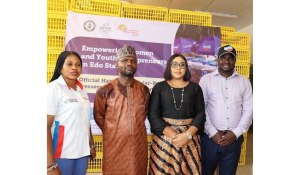
LGCF, Hope Behind Bars Partner on Swift Non-custodial System In Prisons
Legend Golden Care Foundation (LGCF) and Hope Behind Bars Africa, under their joint initiative, Accelerating Justice Reform in Nigeria (AJURN) has launched a policy brief on the strengthening and implementation of non-custodial measures in the nation’s correctional system.
Non-custodial system aims to provide rehabilitative and restorative measures for offenders while allowing them to remain in the community.
This system includes various measures such as probation, parole, community service, fines, restitution, and other community-based sanctions.
To start their campaign, the NGOs recently unveiled a groundbreaking Policy Brief titled “Review and Analysis of the Non-Custodial System in Nigeria.”
The document, presented during an event in Abuja over the weekend, outlined strategic approaches and institutional frameworks for the effective implementation of non-custodial measures as outlined in the Nigerian Correctional Service Act of 2019.
During the event, the executive director of Legend Golden Care Foundation, Mrs. Kanayo Olisa-Metuh, expressed her concern about the current custodial measures implemented within the nation’s correctional system.
She emphasised that the existing approach fails to adequately address the goals of correction, rehabilitation, and restoration for inmates.
Olisa-Metuh argued that imprisoning individuals, particularly those who have committed minor offenses, alongside convicted felons often leads to a cycle of criminal behavior.
She highlighted the need for a shift from a punitive to a restorative approach within the criminal justice system, as the current custodial measures are not fit for their intended purpose.
Additionally, she emphasized that no Nigerian citizen should be treated as mere cannon fodder, as the overpopulation of correctional facilities strains resources and undermines the well-being of the nation.
The executive director of Hope Behind Bars Africa, Mrs. Funke Adeoye, on her part, underscored the fundamental role of the non-custodial service in reforming Nigeria’s correctional institutions and the broader criminal justice system.
She emphasised the importance of capacity building and strengthening criminal justice institutions, including the police, judiciary, and correctional officers responsible for the non-custodial service.
Adeoye commended the constitutional amendment that shifts corrections from the exclusive to the concurrent list, recognizing the need for state-level reforms in correctional facilities.
She called on states to adopt suitable models for the implementation of state corrections and integrate the non-custodial service into their systems, citing the cost-effectiveness and rehabilitative benefits of such an approach.
Adeoye also emphasized the crucial role of private sector involvement and engagement with civil society organizations (CSOs) in advocating for the implementation of the non-custodial service.
Several stakeholders also spoke at the event, highlighting the importance of collaboration and synergy in ensuring the effective implementation of non-custodial measures in correctional facilities.
They emphasised the application of the provisions outlined in the Administration of Criminal Justice Act (ACJA), particularly regarding the Special Non-Custodial Fund and implementing committees.
The attendees at the function included Hon. Luke Onofiok, chairman of the House of Representatives Committee on Judiciary; Hon. Ifeanyi Momah, chairman of the FCT Judiciary; Hon. Anayo Edwin, chairman of the House of Representatives Committee on Reformatory Institution (represented by Prof. Philip Omoke); Caroline Ekemezie, representing the controller-general of Nigeria Correctional Service; Emmanuel Omeke for the controller FCT Command; Ibe Chuks, stood in for the FCT commissioner of police; Mrs. Pwadunmi John Okoh, represented the National Human Rights Commission; His Lordship Odo Celestine, represented the FCT Judiciary; Keran Danyan, represented the Legal Aid Council and various other NGOs and CSOs.







